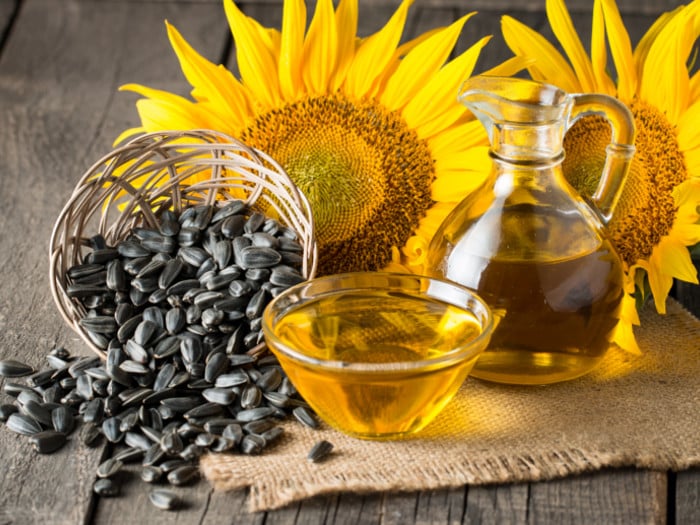Sunflower oil is one of the most used vegetable oils for cooking and deep-frying. It considered an all-purpose oil as it can withstand high temperatures. But if you ask the beauty experts, they will tell you how this seed oil is full of skin-enriching properties as well. The admiration is valid as sunflower oil is a source of compounds that are beneficial for your skin. It contains oleic acid, linoleic acid, and vitamin E, which help fight acne, heal wounds, and moisturize the skin.
If you wish to use natural cosmetics like sunflower oil, this article will help you understand how it can work for your skin.
Benefits of Sunflower Oil for Skin
Sunflower oil makes for an effective shield for your skin. It is a non-comedogenic, an antioxidant, and an excellent wound healer. So, let’s take a look at these benefits in detail.
Skin-protecting Barrier
Applying sunflower oil topically can help protect the integrity of your skin.
In a 2013 study, the University of Sheffield Medical School compared the effects of topical application of olive oil and sunflower oil for 4-5 weeks. The results of this experiment revealed that using sunflower oil can be much more fruitful than olive oil. It improved the health of the outer layer of the skin (stratum corneum), which is the first line of defense against the external atmosphere. Moreover, it also helped in keeping the skin hydrated and fighting skin redness caused by irritation. [1]
How to use: The recommended use here is to take a small amount of cold-pressed organic sunflower oil on your palm and gently massage with it on dry skin.

Sunflower family: Flower, oil, and seeds Photo Credit: Shutterstock
Infant Skin Health
Sunflower seed oil helps in protecting the skin of infants from infections that originate in the hospital. These infections can lead to infant death when not treated properly.
A study published in the Pediatrics journal in 2008 proves the above statement. Here, sunflower seed oil was regularly applied topically on preterm infants for an unspecified period. The results of this study showed that sunflower oil treatment helped in reducing the mortality rates by 26%. [2]
Note: While the research proves that sunflower oil can help protect infants from infections, we suggest you consult with a doctor before it using it on infants.
Wound Healing
Herbal medicine advocates using plant oils that are rich in essential fatty acids (EFA) like linoleic for better wound healing.
Sunflower oil contains linoleic acid, which helps to maintain the skin’s barrier. Many people use sunflower oil topically on their wounds to protect them from infections and to speed up the healing process. [3]
However, a 2019 study shows that this topical use of plant-based oils may be the double-edged sword you don’t want to use. It hints that while sunflower and other oils, which are rich in EFA, help in treating your injuries, they could also cause inflammation. It is advisable to consult with a physician when you have an open wound before using such oils. [4]
Chemopreventive Effect
The Howard University, in a 2002 research paper, found that sunflower oil is a potential chemopreventive agent. The study was focussed on the anti-cancer characteristics of resveratrol, sesamol, sesame oil, and sunflower oil. While the results suggest that sesamol has a strong impact, sunflower oil offered 40 percent protection in the skin cancer test subjects. [5]
Carrier Oil
Sunflower oil is non-comedogenic, which means that it does not clog pores and prevent acne. This property allows it to be a good carrier oil as it helps the essential oils work effectively under the skin. Many people also use it in combination with essential oils for treating skin conditions like eczema and psoriasis. However, thorough research in this aspect is still pending.
How to use: For regular skin, mix a few drops of lavender, thieves, or myrrh essential oils with sunflower seed oil (if you want to heighten the aroma) and use it as a moisturizer.
Buying Sunflower Oil for Skin
When it comes to using sunflower seed oil for skin, always buy a cold-pressed, organic variety as it is a purer, nutrient-dense version.
Risks
In most cases, sunflower oil has a soothing effect on the skin. However, if you are suffering from existing pollen, nut or seed allergy, make sure to check with your doctor before using sunflower oil. [6]
